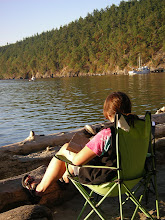If I had to start all over, if I hadn't been at Eastern the past two years, I would strongly consider this program. A very intriguing philosophy. At the same time, any MFA program is what the writer makes of it. In my MFA program, I've been fortunate to have a number of classmates who also write from the foundations of the Judeo-Christian belief system. Though I wish there was greater opportunity for more organized discussion about this, it's come up. In Poetry II, Modernism Form & Theory, some of these ideas came up. And anytime a text alludes to Biblical themes or characters, this has been discussed.
One thing I know for sure, I love the residency MFA program. Moving to a new city to join a community of writers (while also making a newer community, as the incoming group of students), the bi-quarterly "Voice Over" events, the visiting writers, the after-parties, meeting for class each week, the internships (the university press, teaching/Writers in the Community, and literary magazine editing), the literary magazine editor meetings, meeting classmates for coffee, going for runs together, being immersed in the culture of writing...this is only possible with a program where we all come together face to face to live the writing life...especially for someone like me, who I would consider to be not such a traditional graduate student. I started grad school at age 28 (almost 29) after having a full-time public school teaching career for 5 years + a one-year sabbatical (hiatus/escape was more like it!) from the English classroom to work at a Christian camp for a year (marketing & promotions) . I didn't come right from my undergraduate studies, or come after obtaining a different master's degree first. I needed the routine, the motivation of community, the regular social interaction with professors and classmates. I have a friend in a low-residency MFA program for creative non-fiction. It wasn't her first choice, but her and her husband had established jobs in Seattle (hers already involved writing...to pay the bills).
Unless one chooses the research-based UW program or the UW certificate-program (not a credited degree, and far from an MFA course of study), then the choices were limited to low-residency programs. Now, Seattle area writers who want to pursue their MFA can choose from SPU's newly-created MFA program, the low-residency at PLU (which only began in 2004), move to Bellingham and get a MA in English with a Creative Writing emphasis at WWU, come to Eastern, pursue an out-of-state low-residency program or move out of state for a residency MFA program.
Sadly, I'm not quite ready for my experience to end. I now know why it's not such a bad thing to extend the thesis another quarter.
More MFA food for thought:
Subscribe to:
Post Comments (Atom)

No comments:
Post a Comment